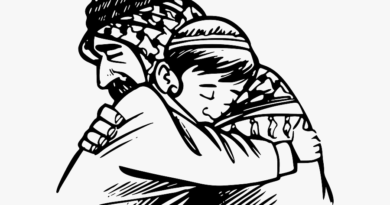Eternity
Eternity
Indrani Rai Medhi
Then she felt herself being swept towards the wide open glass doors of the mall, pushed and jostled towards a place she did not know why she had come to, stirred by an impulse that she no longer cared to question. She held Baby close against her chest, feeling her petal soft cheek against her collarbone. The unsmiling woman in her dark blue sari and name tag gestured towards her bag with a jabbing forefinger and Sneha held it open, shifting Baby to her left arm.
The woman stared inside at the house keys, a handkerchief, a lipstick and a money purse and waved her in, in different. She began to walk along the aisles as if sleepwalking, Baby heavy in her arms. Boxes of cereals, jams of every kind of fruit, Oolong tea, cans of tuna and sardine, salad dressings and pickles red with oil and spices. She picked-up a packet – Ready-to-eat-biryani, put it down, and picked up another. At the freezer she touched the cold cuts of packed meat, the chicken wings and inert sausages and pork chops. People around her were pushing trolleys and filling up baskets, peering into labels, grim and absorbed, frowning, as if it was the most important task of their lives. No one smiled at Baby or clucked her under the chin. No one saw how adorable she was, with her limp curls and plump cheeks and three front teeth, eyes that were wide and dark and fringed with long lashes. She had dressed Baby in her blue Charlie Brown jumpsuit, her best outfit and here they were, not knowing what they were looking for, unaware of what they would find.
They were now further away from the entrance, lost in a maze of aisles that seemed to go in circles. She touched a shampoo on a top shelf and it fell to the floor. Another unsmiling woman in blue picked it up and put it back in its perfect position. There was a new dishwashing liquid, emerald green, like Spring leaves, a liquid that would trickle like honey into the dishes, as she washed them on the kitchen sink late at night and everything would sparkle. On those nights when she could not sleep, and they were getting more and more frequent, she sprayed Colin on the bookcase glass, arranged the newspapers by date and folded Baby’s clothes over and over again, till the night turned into the cold silver of dawn.
Baby wriggles in her arms, trying to get down. Sneha lowers her gently to the floor and Baby totters drunkenly among the shoppers, gurgling with laughter. Sneha holds her hand and they make their slow way up the ramp to Level One, thousands of square feet of frilly dresses, boys’ clothes, Huggies and baby blankets, strollers and cribs, giant teddy bears, tricycles and Barbie dolls. There is a young pregnant woman with her husband who has his hand around her waist, his face bent towards hers, tender, concerned.
Sneha has about three hundred rupees in her purse. What do you need money for? You are in the house all day. Gautam always said this. So, she had just stopped asking, too proud to argue with him. And now of course she could not expect it of him. The college had decided they did not need so many ad hoc teachers. He had come home in a rage and talked of filing a lawsuit to teach the bastards a lesson, of going to the media. For a week he schemed and plotted and then he began to make plans. He would be his own master, an entrepreneur. In the tiny, cramped extra bedroom of their rented third floor flat, where she also hung out Baby’s clothes to dry on a nylon rope hung across, he sat hunched over the computer for hours.
“Shut her up!” He would growl when Baby cried and so she took her often to the balcony, pointing to her the cars down below, the crows on the telephone wires, and children playing cricket on the lane.
She and Baby are now on Level Two and it is a beautiful place, meant for every woman with a dream – this was what the huge gleaming sign on the doorway said. Impossibly beautiful mannequins with slender limbs and perfect aquiline features stand dressed in silk and georgette saris, flowing kurtas and smart pant suits. On glass cases were displayed glittering ornaments and a heavily made-up girl in a red jacket is applying foundation on the wrist of a customer. Rows of sandals with teetering heels, calf skin boots, handbags and gossamer scarves are all around them.
Sneha does not covet anything that she sees. Months of the strain of looking after Baby, of staying cooped up in the flat, of not having anyone to talk to, of the silence and then the rages of Gautam, all these have turned her into a numb, unfeeling shadow of her former self. So, it comes as a surprise to realise that women, most of all women her age, take such pains to make themselves beautiful, desirable. Desire. Gautam desired her once in two weeks. He was rough, his fingers kneading her flesh, leaving bruises, his ragged breathing warm across her face. Afterwards she slept huddled with her back to him, touching Baby’s cheek on the cot beside her, trying to be grateful for this little girl their love had created. Did babies who were created from love differ from the ones created by sex? Was it the same thing? “Ma’am, would you like to try out some perfume?” “I… no thanks,” she says, her voice barely escaping her lips. “We have Victoria’s Secret… our latest is Eternity, by Calvin Klein.”
Eternity. No, it is not a nice word. It frightens her. It speaks in a malicious whisper of things never changing for all time to come. A state of limbo. That was what time had felt like when Baba lay paralysed in the hospital bed. Her brothers had been in such a hurry to cremate him. Eternity is the yawning maw of the pit you were afraid to look.
Sneha looks at her watch. It is 7.45. And they still have another floor to go to. The men’s section is on the next level. Gautam is a careless dresser and his paunch looked more noticeable when he wore T-shirts. But these were things she could not tell him. There were boundaries, so many of them in their marriage that she could not cross. Marriage was like the maze, like aisles of the mall drawing you in deeper and deeper.
Baby is hungry. She cries to be picked up and they walk to the last level. There are chandeliers glowing on the roof, made of glass and wrought iron. There are soft carpets on the floor. Soothing music flows gently from the speakers. All around are sumptuous sofa sets of wood and leather, dining table sets, ornate beds with satin bedspreads, settees and chaise lounges.
Exhausted, Sneha sits on a sofa and picks up Baby. On this floor high up, there is only one staffer, rolling up a carpet and moving out of her sight. She unbuttons her blouse and Baby suckles greedily, waving her feet. Then, ever so slowly, baby falls into a lassitude and Sneha, looking down at her tenderly, sees she is asleep. Would Baby remember this day at the mall in the far-off future, when she would be tall, pretty, smart about the ways of the world? But Sneha then remembers. That would be an eternity. She does not have the strength or the will to wait.
She opens her bag, groping for her cellphone. Her movements become frantic. It is not in her bag. Where has she dropped it? Gautam would be furious. He would perhaps even hit her.
Very carefully, so as not to awaken her, she puts Baby down in the middle of a bed and surrounds her with pillows. She kisses her forehead and walks down the ramp. She would tell them to announce it on the public address system. She is told to go to the ground floor. Her mouth feels dry and her breathing is shallow. If you have found a Nokia phone, kindly deposit it at counter four. The woman’s voice on the PA system sounds bored and metallic.
No one pays the slightest attention. The crowd has thinned. A few people, the last of the shoppers are waiting in queues to pay. Children run around the aisles, whooping with glee.
Through the glass doors she sees a PCO in front. She walks towards it and dials quickly.
“Hello?”
“Where are you?”
“Baby and I came to the mall.” The words stream from his end – savage, hurting.
She hangs up the phone mid- way, and with a shaking hand, pays the coins.
“We are closing soon.” The woman in blue says pointedly. She hurries up the ramp, out of breath, her head aching. She would go home and make a nice meal. Something simple, a fish curry. He would not be angry after that. Perhaps he would even desire her.
Finally Level Four – the store that looked like a queen’s palace. But what was this – an ugly iron shutter blocking the way. Her heart lurches. They have shut down for the night, with Baby asleep on the ornate bed. “Please, please, my baby is in Level Four. And the shutter is down.”
It’s closing time, says a staffer. “Didn’t you lose the phone just now? And now your baby?”
“Yes, yes.”
The staffers look pointedly at each other and a woman in a blue sari touches her head and nudges her colleagues. They do not believe her.
The man who had shut up Level Four has gone. Nobody knows where the keys are. They cannot help her. There are rules. They don’t want trouble.
She waits in the deserted front where the food court has chairs put upside down on the tables and a plastic carry bag tosses aimlessly in the wind. Morning would come, as it always did. But she would have to wait for an eternity. High up inside the massive edifice, a child’s wail drifts in the darkness.
Sometimes, luck can come in strange ways. I really enjoyed writing this story..

Indrani Rai Medhi is a journalist, columñist and author. She has won the Kunjabala Devi award for investigative award for women issues and the Yamin Hazarika award for excellence. She has authored 12 books.




